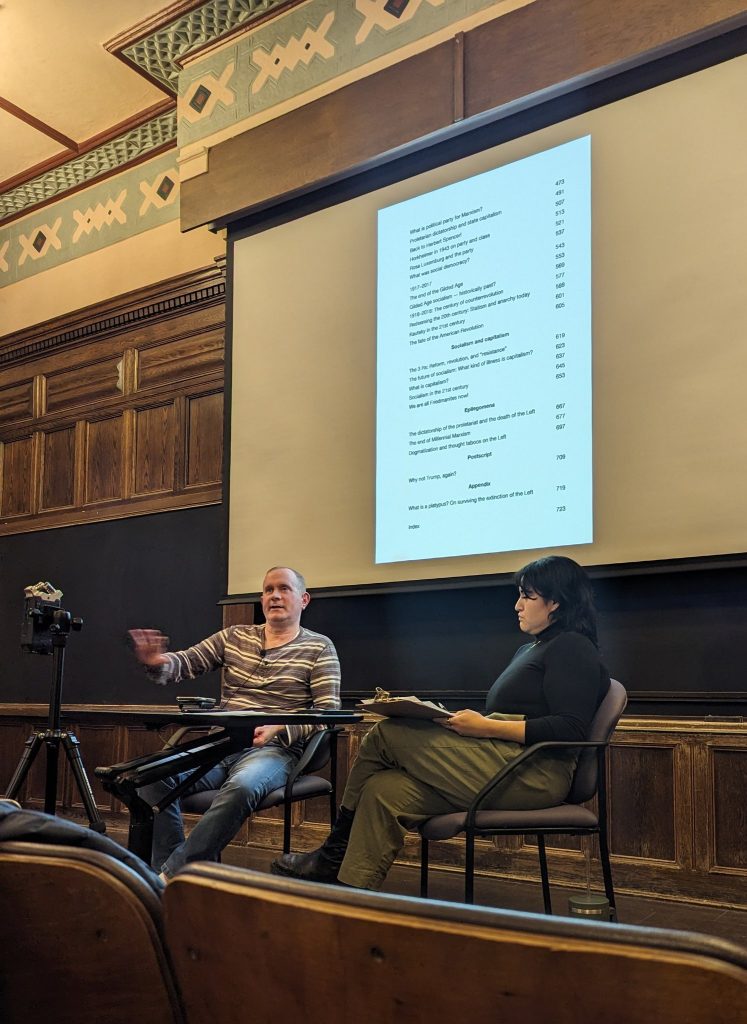Ashley Frawley joins Doug Lain, Chris Cutrone and Ben Studebaker to discuss American politics, the rise of Donald Trump, and the state of the Left.
Chris Cutrone with Doug Lain answering critics on Bonapartism etc.
In this episode of the CutroneZone, the Last Marxist responds to Benjamin Studebaker’s essay, “Beyond Bonapartism: Breaking statephobic thought taboos.” Does Marxism’s political theory hold water?
Chris Cutrone with Jack Ross and Doug Lain on post-neoliberalism and post-Zionism
Jack Ross joins Chris Cutrone and Douglas Lain for a special edition of the CutroneZone on Israeli politics.
Chris Cutrone with Doug Lain on the Trump verdict and the “Left”
This week’s CutroneZone includes his interpretation of the Trump verdict and how we should understand bourgeois law and the rights of the accused.
Chris Cutrone with Nicholas Kiersey on The Death of the Millennial Left and Marxism and Politics
(Video starts at 7:29:00)
Chris Cutrone discussed his books The Death of the Millennial Left and Marxism and Politics with Nicholas Kiersey in the Department of Political Science at the University of Texas, Rio Grande Valley.
Book talk on Marxism and Politics at University of Chicago

On April, 4th 2024 as a part of its 2024 International Convention, the Platypus Affiliated Society hosted a book talk from Chris Cutrone for his upcoming book Marxism and Politics: Essays on Critical Theory and the Party 2006–2024 at the University of Chicago. Preview available at:
https://www.academia.edu/118222480/Marxism_and_Politics_Essays_on_Critical_Theory_and_the_Party_2006_2024_extract
Chris Cutrone is the last Marxist. He teaches Critical Theory at the School of the Art Institute of Chicago and the Institute for Clinical Social Work and completed his PhD on Adorno’s Marxism at the University of Chicago, where he taught for many years in the Social Sciences Core Curriculum, and is the original lead organizer and chief pedagogue of the Platypus Affiliated Society. He is the author of Marxism in the Age of Trump (2018), The Death of the Millennial Left: Interventions 2006–2022 (2023) and Marxism and Politics: Essays on Critical Theory and the Party 2006–2024 (2024).
Chris Cutrone and David Kunsman on The Death of the Millennial Left
Chris Cutrone on modern vs. ancient freedom and Israel-Palestine
Chris Cutrone discusses the current political moment with Douglas Lain. Topics include dialectics, the superiority of Brave New World to 1984, the Palestinian struggle, and why it is that Doug lets Chris get away with murder. Chris and Doug discuss the revival of Osama bin Laden, Marxian value-theory and the state of the Left.
Chris Cutrone with Doug Lain on Palestine protests and the “Left”
Chris Cutrone, author of The Death of the Millennial Left, discusses the left’s embrace of the Israeli/Palestinian conflict as the new center of its political project. Chris Cutrone and Doug continue to discuss the way the American Left has taken up the conflict in Israel as the centerpiece of its political project.
Chris Cutrone with Cadell Last on The Death of the Millennial Left
A discussion with Cadell Last of Philosophy Portal on Chris Cutrone’s book The Death of the Millennial Left.
The Death of the Millennial Left book by Chris Cutrone: https://www.sublationmedia.com/produc…